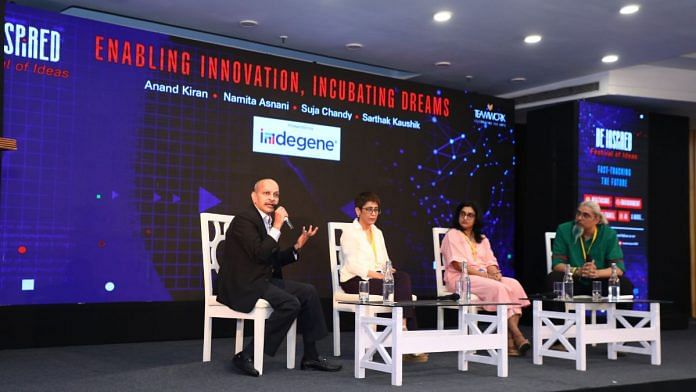New Delhi: Artificial Intelligence has rejigged the way people listen to music, stream movies, navigate travel plans, and pay for their utilities. Human society is standing at the cusp of the fourth industrial revolution or Industry 4.0 i.e, there’s no escaping AI.
The mutation of human behaviour with the transformative pace of technology was central to the panel discussion, ‘Enabling Innovation, Incubating Dreams’ at TeamWork Art’s ‘Festival of Indias’ at India International Centre (IIC) in Delhi on 15 April.
“What is relevant today is not relevant tomorrow,” said panellist Suja Chandy, former managing director, Nissan Digital India and independent advisor on tech solutions.
Human behaviour and technology are focal points of interest for most industries around the world. ChatGPT, the new-age tech buzzword amassed over a million users within five days of its launch.
These are exciting times. Microsoft Chairman and CEO Satya Nadella had described it as the “golden age”, during the World Economic Forum earlier this year.
Also read: Skills, competencies will drive future than degrees; old jobs vanishing due to technology: Pradhan
The next frontier in innovation
But as society marches to the drumbeat of AI and innovation, sustainability cannot be disregarded.
“We are at an inflection point. We had thought that our resources and sinks — waste streams — are unlimited. As we innovate and progress, we also need to focus on waste management. Innovation needs to work in tandem with sustainability. That is the only way,” said panellist Namita Asnani, head of the sustainability program at Hitachi Energy, on the future of innovation.
While the industrial revolutions over the last 200 years have created a lot of wealth, it was not uniform. Not everyone benefited from them equally. And each revolution contributed to increased greenhouse gas emissions and accelerated climate change.
“We have been working on linear models, but it is time to start thinking about circular models,” said Asnani, emphasising that whatever waste we produce must go back into enriching new innovations.
The impact on power consumption is another aspect that is expected to undergo a transformation.
The informational technology sector is one of the biggest consumers of electricity, according to Chandy. With more data centres, and more UPI transactions, power consumption and quality of life have increased and upgraded. Just in February this year, power consumption grew 9 per cent to 117.84 billion units in India.
“In the next five years, 85 per cent or more organisations, irrespective of sectors, are going to be approaching a cloud-first strategy,” added Chandy.
This makes sustainable models all the more important.
The future of AI
With over a billion people using mobile phones in India, and over 700 million smartphone users, people do UPI transactions as effortlessly as texting.
“A bank like State Bank of India does over Rs 10 crore UPI transactions daily. We were able to scale up our vaccination distribution, and bank account holders quickly because of our robust digital infrastructure. All of this contributes to innovation,” said Chandy.
AI not only promises to offer efficient ways to accelerate innovation, it also enables better business outcomes. In a recent study at Lenovo, AI-equipped technology outperformed an accomplished worker in each test with improved production efficiency.
Technologies like AI and cloud computing can help industries meet environmental, social, and governance (ESG) goals. They can help reduce energy consumption and carbon emissions by revamping power usage and advanced methods to cool data centers, MIT Technology Review quoted Dr Yong Rui, chief technology officer and senior vice president of Lenovo Group.
Asnani agreed. “AI and digitisation will help dematerialise the economies, hence it will play a big role in the sustainability journey,” she added.
Also read: German magazine fires editor over AI ‘interview’ with Michael Schumacher
What’s next — 5IR, circular economy
While the fourth industrial revolution is slipping through the cracks of our daily lives, there are already talks of a fifth one. The 5IR or fifth industrial revolution builds on the existing automation, crypto, blockchain, and other related technologies.
“5IR ties well with sustainability. This is not just for the common person but for industries across sectors,” said Chandy. She also noted how the pandemic, the “black swan” event of humanity, has accelerated the industrial revolution.
While AI is the future, it is also the biggest threat when it comes to creative industries. The circular economy will dictate the choices made by the fashion industry, according to experts.
Asnani reiterated the need and significance of a circular model and design, which means creating products that are meant to last longer before being recycled instead of the ones that have a linear life cycle.
“Why buy new clothes when you can make your existing clothes fashionable? That should be the new style statement,” she said.



